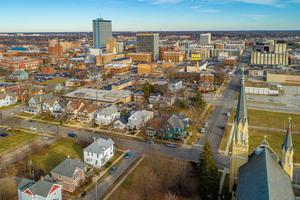Welcome to Our Changing Church
More and more, dioceses are closing or consolidating parishes to cope with the twin realities of fewer priests and declining Mass attendance.

Noticing that some of his listeners were having trouble understanding his accented English, the African priest paused his homily, grinned at the nearly all-white congregation, and said, “If you don’t produce more vocations, this is what you get.” People laughed and the homilist continued as before.
Welcome to our changing Church. This incident during a Sunday morning Mass in a Maryland suburb of Washington, D.C., was likely a forerunner of other such incidents in days to come. Mild culture shock probably will spread as priests from parts of the world where there are still priests to spare — I mean Africa, the Philippines and India — more and more fill the gap created by the growing shortage of home-grown priests.
To some extent, the shortage isn’t new. Except during the religious boom immediately following World War II, Catholicism in the U.S. has never been particularly distinguished for generating priestly vocations, but then priests from Ireland and other European countries met the need. Now, however, priestly vocations are way down in Ireland and the rest of Western Europe, so with growing frequency it’s Africans, Filipinos and Indians who are lending a hand.
Note, though, that our priest shortage didn’t happen overnight.
According to the Center for Applied Research in the Apostolate, in 1965, with the U.S. Catholic population around 50 million, 95% of the country’s 36,467 diocesan priests were engaged in active ministry; last year, 73.5 million Catholics were being served by 66% of the 24,110 priests (most of the other 34% were retired). Ordinations dropped from 805 in 1970 to 451 last year (including religious order priests).
The falloff in priests is only part of the story of our changing Church. There are, of course, places where the population as a whole is rising rapidly, with Catholics part of the increase and the local churches hard-pressed to keep up.
More commonly, though, every couple of weeks bring news of another diocese closing or consolidating a substantial number of its parishes in order to cope with the twin realities of fewer priests and declining Mass attendance. (In 1970, Catholics who attended Mass weekly or more often were 54.9%, but by 2022 the figure was 17.3%. Monthly or more frequent Mass attendance — including the weekly or more frequent attenders — was 71.3% in 1970 and 36.6% in 2022.)
These developments sometimes are greeted with reactions that in charity can at best be called unreflective, including lambasting the bishops and their advisers for reacting to dwindling Mass attendance and fewer priests by closing and consolidating parishes. Not long ago, for instance, I came across an angry internet outburst accusing unnamed “ecclesiastical bureaucrats” of supposedly being either ignorant of or indifferent to the fact that, when a parish is closed, some people simply stop attending Mass.
It’s safe to say no bishop — and probably no ecclesiastical bureaucrat either — would close down parishes if declining Mass attendance and a serious shortfall of priests didn’t make that the only responsible, though admittedly painful, thing to do.
Such complaints reflect the clericalized lay mentality that David Byers and I describe in our new book Revitalizing Catholicism in America: Nine Tasks for Every Catholic (Our Sunday Visitor Publishing). But if someone in a recently closed parish truly wants to go to Mass but lacks transportation, instead of blaming the bishop, offer the needy person a lift. And if numbers require it, organize a group of Good Samaritans to do that weekly for all those who require help getting to church. Don’t waste time criticizing and complaining. Solve the problem.
- Keywords:
- church closures
- church
- catholic demographics
















